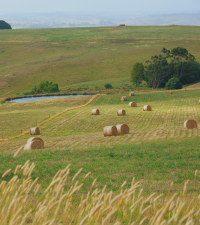Decarbonization 2.0. From Compliance to Competitive Advantage and Innovation
May 16, 2024

HowGood and Kerry have worked together over the past year to bring sustainability into Kerry’s product innovation stages and develop clear mechanisms for communicating environmental impact to Kerry’s customers. Kerry is firmly established as a market leader in the globalization of food taste and ever-evolving consumer needs, with 22,000+ staff and 150+ innovation and manufacturing centers across 30+ countries. In 2023, Kerry had a group revenue of 8 billion and now reaches over 1 billion consumers around the world.
From embedding sustainability into the innovation stage of product design, to procurement strategies, supplier engagement, customer collaboration and ultimately marketing claims, Kerry has successfully established itself as a global leader in sustainable nutrition.
In Decarbonization 2.0: From Compliance to Competitive Advantage and Innovation, leaders from both companies partner to deliver actionable insights and frameworks that food companies can use as they develop holistic sustainability strategies that boost ROI. They review the limitations of a compliance-based approach and demonstrate how food companies can transform sustainability into a competitive advantage, including driving C-Level interest in pushing initiatives forward.
Pressure on food companies to develop better sustainability strategies
We’re currently experiencing an exponential increase around the world in regulatory and industry pressure on food companies to take immediate action on carbon reduction.
Many companies already use voluntary frameworks – for example, setting science-based climate action targets through the Science Based Targets Initiative (SBTi) and committing to the Task Force on Climate-Related Financial Disclosures (TCFD). We’re currently in the midst, however, of unprecedented regulatory changes, with more and more companies around the world required to make some level of climate disclosures.
Examples of this uptick in regulatory action can be seen with the EU’s Corporate Sustainability Reporting Directive (CSRD) and Carbon Border Adjustment Mechanism (CBAM), as well as with California’s new climate laws.
The movement is no longer specific just to the United States or European Union, and encompasses multiple global regions. For example, Singapore is adopting climate related disclosure requirements, and countries including Japan, Brazil and South Africa are doing the same.

A key takeaway in observing these regulations is becoming clear – there’s a growing expectation for sustainability data to match the quality, rigor and data assurance standards used for corporate financial data. The reporting standards for sustainability are becoming more unified, and assurance is becoming mandatory in some regions. The necessity for carbon accounting to be as comprehensive as possible is also increasing – across full product life cycles and including Scope 1, 2 and 3.

The United Nations recently stated that we are on track to achieve 2.7 degrees of global warming, while the Paris agreement demonstrated a commitment on behalf of participants to limit warming to 1.5 degrees. What appears as a small variance in those numbers actually represents a huge difference in impact to the level of potential global destruction. There exists an urgency to act on decarbonization to mitigate climate impacts as quickly as possible.
Compliance: Regulatory impact on the food value chain
Within these regulatory frameworks and increased market pressure, governments, investors, and consumers are demanding companies such as retailers, for example, submit their sustainability data.
As retailers receive these sustainability requests, they’re reaching out to their food and beverage brands for the data needed to support their responses.
These food and beverage brands then ask their ingredient and solution providers, like Kerry, for sustainability data, and these companies in turn then make requests to their raw material suppliers and growers.

These data requests quickly add up upstream, leading to sustainability survey fatigue. It’s estimated that 75% of a sustainability team’s time is spent on gathering and analyzing data, searching for emissions factors, evaluating data quality, trying to align to complex and ever-evolving carbon accounting standards, asking their suppliers for information, and then trying to quantify the impact of reduction initiatives. This leaves little time for actual climate action.
Eighty five percent of food companies around the world believe that getting primary data is becoming a barrier for them to set science-based targets and only 2% of suppliers are able to provide product level sustainability data, according to an SBTi corporate survey.
Leveraging sustainability for competitive advantage and innovation
“My advice to people working to decarbonize within the complexities of our food system would be, don’t try to do everything alone. Collaborate. There’s a lot of great expertise out there. Let’s work together to do this because we can accelerate the impact if we all work together as an industry.” – Aoife Marie Murphy, Senior Manager of Sustainable Nutrition at Kerry
“What I’ve learned through these projects is that it’s not as complicated as you think it’s probably going to be. There are a lot of people out there who can support the sustainability journey within the food industry, so facilitating that collaboration is key.” – Patrick O’Driscoll, Head of Research and Development at Kerry
While the need for sustainability data was often previously addressed by commissioning Life Cycle Assessments (LCAs), the expense, time resources, limitations of system boundaries, and lack of actionability they provide make this method unsustainable for food companies.
Companies end up investing substantial resources in LCAs while often getting only average sustainability data. The question becomes, how can food companies generate better data to benefit more stakeholders, from government entities, to investors, to B2B customers, to consumers and the planet.

“One framework that we like to use here at HowGood is looking at how we can 10x the value of the sustainability data a company is getting. It’s simple yet very powerful,” shares João Brites, Director of Growth and Innovation for HowGood in Europe. “This framework says, look, there are only so many ways that you can generate business value. You either grow the upside or you reduce the downside. You’re either working on something that is tangible that you can easily measure like your revenue and assets, or you’re working on something that is intangible and difficult to measure, but that influences your market valuation.”
“So the question becomes, ‘you’re investing so much in sustainability data, so much time, so much money, what is the ROI of your sustainability data. How much value are you getting from this data that is very difficult to collect, harmonize and analyze?” asks João.

“It’s really about figuring out, how can carbon data grow revenue? Can carbon data help sell more product? Can it help you charge a price premium? Can it help you gain an increase in market share? How might carbon data drive differentiation?,” says João. “Let’s create a discussion around sustainable innovation as a differentiation strategy. Let’s share how carbon data can help you attract and retain talent or build customer trust and loyalty.”
“And then let’s look at how carbon data can reduce costs, either because you’re using resources more efficiently, or in the case of carbon taxes, where you can reduce indirect costs. You might be reducing the cost of goods sold or even working to reduce risk,” João states.
It becomes clear when looking at the quadrants above, that for companies viewing sustainability solely through the lens of compliance, they’re being left behind on the bigger opportunity to transform carbon data into something that can drive real business value.
Aoife shares that “by positioning Kerry as the partner of choice around innovation, co-creation, and sustainable design, we really help to accelerate sustainability ROI for our customers. We think about solutions that include our portfolio and technologies like HowGood, and bring all of this together to think holistically about a product and help address complex challenges for our customers.”
“Sustainable product design is the fastest and most impactful way for our customers to reach their nutritional targets and their environmental targets.” – Aoife Marie Murphy, Senior Manager of Sustainable Nutrition at Kerry
For companies to benefit commercially from sustainability efforts, it’s important to ensure that the data permeates commercial functions and isn’t sitting solely with the sustainability team. João shares, “It’s about how many loops does your sustainability data support? Does it touch R&D? Does it touch procurement? Does it touch the innovation team? Does it touch the marketing department? And the more of those connecting loops that sustainability data makes, the more value is added within the company and to the food system.”
Kerry has successfully moved from a compliance-based approach to using sustainability as a centerpiece in their commercial strategy. Patrick shares “It’s something that consumers and customers are asking for more and more, but even aside from that, we believe as a company that it’s really important for everyone to leverage sustainability throughout the whole value chain.”
“We all have a responsibility to work towards Net Zero,” he states. “We all have our own company targets, measurements and quantification to help make better decisions. But it’s a system, and collaboration is required. We need information from people who need information from us. We’re all working towards the same thing. So it’s important that everyone across the full food value chain is trying together.”
Learn how Kerry increased ROI by embedding sustainability into their product design and leveraging it in customer relationships and consumer marketing claims.



.png)
